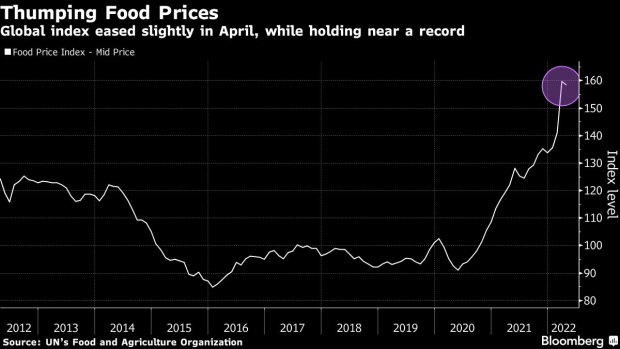May 11, 2022
Africa Faces Unrest as Thumping Food Prices Hit It Hardest
, Bloomberg News

(Bloomberg) -- Surging international food prices will hit Africa’s economies the hardest and may trigger social unrest if governments fail to cushion the blow, according to a report by Oxford Economics Africa.
Food has a heavier weighting in the inflation baskets of African nations, compared with those in advanced economies, due to purchasing patterns. In advanced economies it accounts for as much as 15% of the basket, while in Africa it exceeds 25%, with some countries including Ethiopia, Zambia, Sudan, and Nigeria having food weightings above 50%, economists Jacques Nel and Petro van Eck, at Oxford Economics Africa said in a research note.
The war in Ukraine, bans on food exports such as palm oil, supply chain glitches and a drought curbing the US wheat crop have sent prices skyrocketing. In March the UN’s FAO food price index soared 13%, the fastest pace on record, before easing slightly in April.
Higher food prices coupled with soaring fuel bills and rising unemployment make for a volatile political environment on the continent and have prompted governments to react even at the expense of fiscal consolidation, said Nel and van Eck.
Egypt and Nigeria have delayed plans to end costly food and fuel subsides while Morocco, Kenya, and Benin have increased minimum wages and South Africa has extended monthly stipends for the jobless and cut its general fuel levy for two months.
Nations that have had their fiscal wings clipped and are unable to provide significant support however, such as Ghana and Tunisia, may face popular backlash, the authors said.
Data on Wednesday showed Ghana’s inflation rate climbed to an 18-year high in April fueled by food price growth that surged to 26.6%, compared with a year earlier. Finance Minister Ken Ofori-Atta will hold a briefing Thursday.
©2022 Bloomberg L.P.







